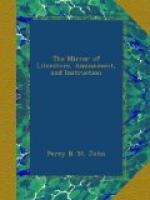by the shouts which assailed him as he rowed along,
of “Overboard he vent, overboard he vent!”
King Boongarre, too, with a boat-load of his dingy
retainers, may possibly honour you with a visit, bedizened
in his varnished cocked-hat of “formal cut,”
his gold-laced blue coat (flanked on the shoulders
by a pair of massy epaulettes) buttoned closely up,
to evade the extravagance of including a shirt in the
catalogue of his wardrobe; and his bare and broad platter
feet, of dull cinder hue, spreading out like a pair
of sprawling toads, upon the deck before you.
First, he makes one solemn measured stride from the
gangway; then turning round to the quarter-deck, lifts
up his beaver with the right hand a full foot from
his head, (with all the grace and ease of a court
exquisite,) and carrying it slowly and solemnly forwards
to a a full arm’s-length, lowers it in a gentle
and most dignified manner down to the very deck, following
up this motion by an inflection of the body almost
equally profound. Advancing slowly in this way,
his hat gracefully poised in his hand, and his phiz
wreathed with many a fantastic smile, he bids
massa
welcome to
his country. On finding he has
fairly grinned himself into your good graces, he formally
prepares to take leave, endeavouring at the same time
to
take likewise what you are probably less
willing to part withal—namely, a portion
of your cash. Let it not be supposed, however,
that his majesty condescends to
thieve; he only
solicits the
loan of a
dump, on pretence
of treating his sick
gin [wife] to a cup of
tea, but in reality with a view of treating
himself
to a porringer of “Cooper’s best,”
to which his majesty is most royally devoted.
You land at the government wharf on the right, where
carts and porters are generally on the look-out for
jobs; and on passing about fifty yards along the avenue,
you enter George-street, which stretches on both hands,
and up which, towards the left, you now turn, to reach
the heart of the town.
* * * *
*
Although all you see are English faces, and you hear
no other language but English spoken, yet you soon
become aware that you are in a country very different
from England, by the number of parrots and other birds
of strange notes and plumage which you observe hanging
at so many doors, and cagesful of which you will soon
see exposed for sale as you proceed. The government
gangs of convicts, also, marching backwards and forwards
from their work in single military file, and the solitary
ones straggling here and there, with their white woollen
Paramatta frocks and trousers, or gray or yellow jackets
with duck overalls, (the different styles of dress
denoting the oldness or newness of their arrival,)
all bedaubed over with broad arrows, P.B.’s,
C.B.’s, and various numerals in black, white,
and red, with perhaps the jail-gang straddling sulkily
by in their jingling leg-chains,—tell a
tale too plain to be misunderstood. At the corners
of streets, and before many of the doors, fruit-stalls
are to be seen, teeming, in their proper seasons,
with oranges, lemons, limes, figs, grapes, peaches,
nectarines, apricots, plums, apples, pears, &c. at
very moderate prices.—Two Years in New
South Wales.




